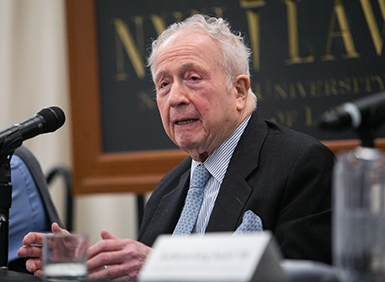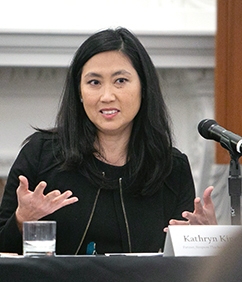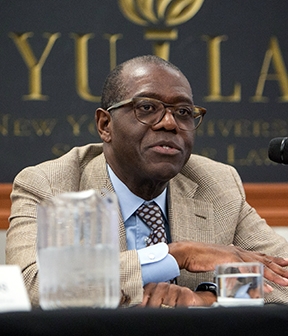Shareholder value isn’t the corporation’s only responsibility, panelists say at Latham Forum
On November 6, a Latham & Watkins Forum examined the question, “For Whom is the Corporation Managed?” Opening the discussion, moderator Edward Rock, Martin Lipton Professor of Law, cited a recent Business Roundtable statement that named employees, customers, suppliers, and community as “essential” stakeholders of the corporation, alongside its shareholders. That’s a big change, Rock noted, from a 1997 statement from the same organization that put shareholders first.
The panelists—Martin Lipton ’55, a founding partner of Wachtell, Lipton, Rosen & Katz; Kathryn King Sudol ’98, a corporate partner at Simpson Thacher & Bartlett; and Anthony Welters ’77, executive chair of BlackIvy LLC—broadly concurred that well-run corporations do not prioritize shareholders’ interest at the expense of other groups. “If you want to have a sustainable enterprise, you’d better take into account all of your constituencies and not just one,” Welters said. The discussion also explored how companies are reacting to new pressures from investors to follow environmental, social, and corporate governance (ESG) standards.
Selected quotes:
Martin Lipton: “One of the causes of populist discontent is the actual decline in effective real income of the average working person in the United States over the last 35-odd years.… It is reflective of a disproportionate share of corporate profits going to shareholders rather than to employees and other stakeholders. So that if you step back and look at it from a societal standpoint, it’s clear that shareholder primacy and maximizing value for shareholders will not stand up. And there are those of us who think that they do not have to stand up because that was never the intention of the corporate law in Delaware.”
Kathryn Sudol: “Delaware has the business judgment rule, and there is a lot of latitude given to directors within the business judgment rule. In my view, the [Business Roundtable] statement is not inconsistent with the state of the law in that directors do have the ability, in complying with their fiduciary duties, to look at all aspects of the corporation—to look at employees, to look at customers, to look at whether they’re using ethical suppliers, as well as these ESG issues, which have become major issues for corporate boards.”
Anthony Welters: “I do a lot of investing in Sub-Saharan Africa now…. I’ve seen the impact of state-owned companies showing up on that continent. And it’s going to be very, very challenging for US corporations to compete against cheap state-owned corporations with their money. So what we have to do is to attract talented people, reward them, put the wind at their back so they can be the next generation of extraordinary performers. Because if you can’t do that, you can’t compete. This notion of quarter-to-quarter is something, in my view, that is not sustainable.”
Follow the full discussion on video:
Posted December 2, 2019




